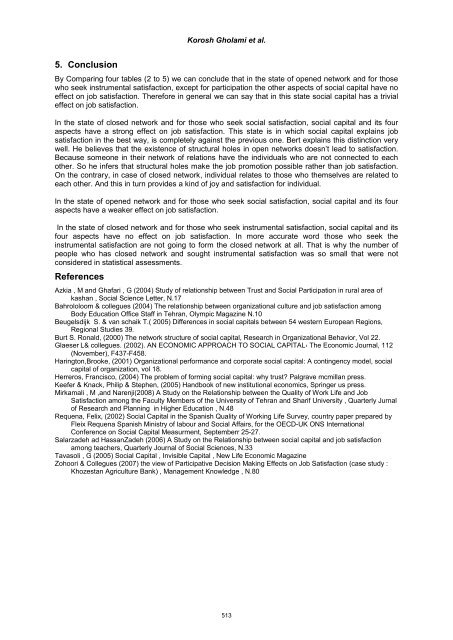Proceedings of the 3rd European Conference on Intellectual Capital
Proceedings of the 3rd European Conference on Intellectual Capital
Proceedings of the 3rd European Conference on Intellectual Capital
Create successful ePaper yourself
Turn your PDF publications into a flip-book with our unique Google optimized e-Paper software.
5. 4BC<strong>on</strong>clusi<strong>on</strong><br />
Korosh Gholami et al.<br />
By Comparing four tables (2 to 5) we can c<strong>on</strong>clude that in <str<strong>on</strong>g>the</str<strong>on</strong>g> state <str<strong>on</strong>g>of</str<strong>on</strong>g> opened network and for those<br />
who seek instrumental satisfacti<strong>on</strong>, except for participati<strong>on</strong> <str<strong>on</strong>g>the</str<strong>on</strong>g> o<str<strong>on</strong>g>the</str<strong>on</strong>g>r aspects <str<strong>on</strong>g>of</str<strong>on</strong>g> social capital have no<br />
effect <strong>on</strong> job satisfacti<strong>on</strong>. Therefore in general we can say that in this state social capital has a trivial<br />
effect <strong>on</strong> job satisfacti<strong>on</strong>.<br />
In <str<strong>on</strong>g>the</str<strong>on</strong>g> state <str<strong>on</strong>g>of</str<strong>on</strong>g> closed network and for those who seek social satisfacti<strong>on</strong>, social capital and its four<br />
aspects have a str<strong>on</strong>g effect <strong>on</strong> job satisfacti<strong>on</strong>. This state is in which social capital explains job<br />
satisfacti<strong>on</strong> in <str<strong>on</strong>g>the</str<strong>on</strong>g> best way, is completely against <str<strong>on</strong>g>the</str<strong>on</strong>g> previous <strong>on</strong>e. Bert explains this distincti<strong>on</strong> very<br />
well. He believes that <str<strong>on</strong>g>the</str<strong>on</strong>g> existence <str<strong>on</strong>g>of</str<strong>on</strong>g> structural holes in open networks doesn’t lead to satisfacti<strong>on</strong>.<br />
Because some<strong>on</strong>e in <str<strong>on</strong>g>the</str<strong>on</strong>g>ir network <str<strong>on</strong>g>of</str<strong>on</strong>g> relati<strong>on</strong>s have <str<strong>on</strong>g>the</str<strong>on</strong>g> individuals who are not c<strong>on</strong>nected to each<br />
o<str<strong>on</strong>g>the</str<strong>on</strong>g>r. So he infers that structural holes make <str<strong>on</strong>g>the</str<strong>on</strong>g> job promoti<strong>on</strong> possible ra<str<strong>on</strong>g>the</str<strong>on</strong>g>r than job satisfacti<strong>on</strong>.<br />
On <str<strong>on</strong>g>the</str<strong>on</strong>g> c<strong>on</strong>trary, in case <str<strong>on</strong>g>of</str<strong>on</strong>g> closed network, individual relates to those who <str<strong>on</strong>g>the</str<strong>on</strong>g>mselves are related to<br />
each o<str<strong>on</strong>g>the</str<strong>on</strong>g>r. And this in turn provides a kind <str<strong>on</strong>g>of</str<strong>on</strong>g> joy and satisfacti<strong>on</strong> for individual.<br />
In <str<strong>on</strong>g>the</str<strong>on</strong>g> state <str<strong>on</strong>g>of</str<strong>on</strong>g> opened network and for those who seek social satisfacti<strong>on</strong>, social capital and its four<br />
aspects have a weaker effect <strong>on</strong> job satisfacti<strong>on</strong>.<br />
In <str<strong>on</strong>g>the</str<strong>on</strong>g> state <str<strong>on</strong>g>of</str<strong>on</strong>g> closed network and for those who seek instrumental satisfacti<strong>on</strong>, social capital and its<br />
four aspects have no effect <strong>on</strong> job satisfacti<strong>on</strong>. In more accurate word those who seek <str<strong>on</strong>g>the</str<strong>on</strong>g><br />
instrumental satisfacti<strong>on</strong> are not going to form <str<strong>on</strong>g>the</str<strong>on</strong>g> closed network at all. That is why <str<strong>on</strong>g>the</str<strong>on</strong>g> number <str<strong>on</strong>g>of</str<strong>on</strong>g><br />
people who has closed network and sought instrumental satisfacti<strong>on</strong> was so small that were not<br />
c<strong>on</strong>sidered in statistical assessments.<br />
5BReferences<br />
Azkia , M and Ghafari , G (2004) Study <str<strong>on</strong>g>of</str<strong>on</strong>g> relati<strong>on</strong>ship between Trust and Social Participati<strong>on</strong> in rural area <str<strong>on</strong>g>of</str<strong>on</strong>g><br />
kashan , Social Science Letter, N.17<br />
Bahrololoom & collegues (2004) The relati<strong>on</strong>ship between organizati<strong>on</strong>al culture and job satisfacti<strong>on</strong> am<strong>on</strong>g<br />
Body Educati<strong>on</strong> Office Staff in Tehran, Olympic Magazine N.10<br />
Beugelsdijk S. & van schaik T.( 2005) Differences in social capitals between 54 western <str<strong>on</strong>g>European</str<strong>on</strong>g> Regi<strong>on</strong>s,<br />
Regi<strong>on</strong>al Studies 39<br />
Burt S. R<strong>on</strong>ald, (2000) The network structure <str<strong>on</strong>g>of</str<strong>on</strong>g> social capital, Research in Organizati<strong>on</strong>al Behavior, Vol 22.<br />
Glaeser L& collegues. (2002). AN ECONOMIC APPROACH TO SOCIAL CAPITAL The Ec<strong>on</strong>omic Journal, 112<br />
(November), F437-F458.<br />
Haringt<strong>on</strong>,Brooke, (2001) Organizati<strong>on</strong>al performance and corporate social capital: A c<strong>on</strong>tingency model, social<br />
capital <str<strong>on</strong>g>of</str<strong>on</strong>g> organizati<strong>on</strong>, vol 18.<br />
Herreros, Francisco, (2004) The problem <str<strong>on</strong>g>of</str<strong>on</strong>g> forming social capital: why trust? Palgrave mcmillan press.<br />
Keefer & Knack, Philip & Stephen, (2005) Handbook <str<strong>on</strong>g>of</str<strong>on</strong>g> new instituti<strong>on</strong>al ec<strong>on</strong>omics, Springer us press.<br />
Mirkamali , M ,and Narenji(2008) A Study <strong>on</strong> <str<strong>on</strong>g>the</str<strong>on</strong>g> Relati<strong>on</strong>ship between <str<strong>on</strong>g>the</str<strong>on</strong>g> Quality <str<strong>on</strong>g>of</str<strong>on</strong>g> Work Life and Job<br />
Satisfacti<strong>on</strong> am<strong>on</strong>g <str<strong>on</strong>g>the</str<strong>on</strong>g> Faculty Members <str<strong>on</strong>g>of</str<strong>on</strong>g> <str<strong>on</strong>g>the</str<strong>on</strong>g> University <str<strong>on</strong>g>of</str<strong>on</strong>g> Tehran and Sharif University , Quarterly Jurnal<br />
<str<strong>on</strong>g>of</str<strong>on</strong>g> Research and Planning in Higher Educati<strong>on</strong> , N.48<br />
Requena, Felix, (2002) Social <strong>Capital</strong> in <str<strong>on</strong>g>the</str<strong>on</strong>g> Spanish Quality <str<strong>on</strong>g>of</str<strong>on</strong>g> Working Life Survey, country paper prepared by<br />
Fleix Requena Spanish Ministry <str<strong>on</strong>g>of</str<strong>on</strong>g> labour and Social Affairs, for <str<strong>on</strong>g>the</str<strong>on</strong>g> OECD-UK ONS Internati<strong>on</strong>al<br />
<str<strong>on</strong>g>C<strong>on</strong>ference</str<strong>on</strong>g> <strong>on</strong> Social <strong>Capital</strong> Measurment, Septemberr 25-27.<br />
Salarzadeh ad HassanZadeh (2006) A Study <strong>on</strong> <str<strong>on</strong>g>the</str<strong>on</strong>g> Relati<strong>on</strong>ship between social capital and job satisfacti<strong>on</strong><br />
am<strong>on</strong>g teachers, Quarterly Journal <str<strong>on</strong>g>of</str<strong>on</strong>g> Social Sciences, N.33<br />
Tavasoli , G (2005) Social <strong>Capital</strong> , Invisible <strong>Capital</strong> , New Life Ec<strong>on</strong>omic Magazine<br />
Zohoori & Collegues (2007) <str<strong>on</strong>g>the</str<strong>on</strong>g> view <str<strong>on</strong>g>of</str<strong>on</strong>g> Participative Decisi<strong>on</strong> Making Effects <strong>on</strong> Job Satisfacti<strong>on</strong> (case study :<br />
Khozestan Agriculture Bank) , Management Knowledge , N.80<br />
513
















